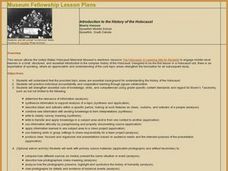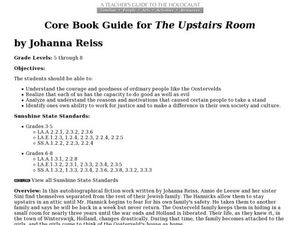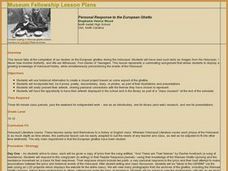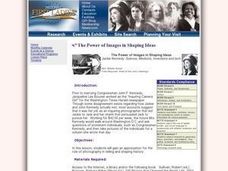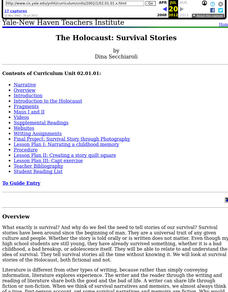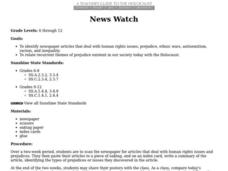Curated OER
Help Me Learn About the Holocaust
Young readers select a book from a provided list to use as the basis for an intensive class study of Holocaust novels. After completing their novels, groups create a multimedia presentation highlighting the elements of literature...
Curated OER
Introduction to the History of the Holocaust
The Holocaust is unbelievable! Examine this piece of history with your class. Using the Internet, research groups determine the relevance of information presented, compare how different sites present the same information, synthesize...
Curated OER
Creating an Oral History--Who Tells the Story?
Explore the difficulties in compiling an oral history with this lesson. Young researchers conduct interviews and consider how point of view changes various accounts of a single incidence, resulting in conflicting information. They view a...
University of Southern California
Deconstructing Genocide: The Ultimate Crime Against Humanity
There are eight stages of an atrocity known as genocide, and it's important to understand how they are represented so we can fight against it in the future. As young historians watch video clips of ten Jewish Holocaust survivors'...
Facing History and Ourselves
The Weimar Republic: Historical Context and Decision Making
Did you know that way before Hitler became a dictator, he actually spent nine months in a German jail? Provide the background for the escalating point before the Nazi party took over in World War II through the exercises in the resource....
Curated OER
Holocaust Theme
Students complete a unit of lessons on the events of the Holocaust during WWII. They write daily journal entries, create a collage, view and discuss videos, read and analyze novels and poetry, and complete a novel project.
Curated OER
Children in Hiding During the Holocaust
Learners examine the different ways in which children hid trying to escape the concentration camps. Using journal entries, they put themselves into the role of the children and imagine their feelings during the Holocaust. They discuss...
Curated OER
Life During the Great Depression An Oral History Project
Although our connections to those who personally witnessed the Holocaust are dwindling, this lesson focuses on conducting an interview and getting some primary source material. There is a list of resources your high schoolers can...
Curated OER
Oral History
Students create oral histories. In this oral history lesson, students prepare for and conduct interviews with Holocaust survivors, liberators, or rescuers. Students study the provided procedure for the interview and present their...
Curated OER
Core Book Guide for The Upstairs Room
Learners read "The Upstairs Room" and participate in literature analysis regarding justice. In this Holocaust Literature instructional activity, students read a short story and discuss critical thinking questions. Learners write journal...
Curated OER
Personal Response to the European Ghetto
Students examine the characteristics of the ghettos during the Holocaust. Reading various texts on the subject, they gather important information related to the event. They create a visual project of the ghettos and shares them with...
National First Ladies' Library
The Power of Images in Shaping Ideas
Learners examine the role of photography in recording and sharing history. They view online photos that Life magazine has identified as changing the world, then conduct research on one of the photos. Students create and present an oral...
Curated OER
Persuasive Letter Presenting the Case For Meeting the Need
Eighth graders choose from various works of literature, and participate in many activities regarding their chosen book. Students write persuasive papers and oral presentations discussing the needs of others.
Curated OER
The Holocaust: Survival Stories
Students use survival stories as the theme for written assignments and a photography presentation.
Curated OER
Human Rights Violations
Students explore how human rights are different in each part of the world. In this freedome lesson, students define human rights, research how human rights in one country ultimately affect other countries, and share their findings...
Curated OER
News Watch
Eighth graders explore the concept of human rights. In this US History instructional activity, 8th graders research newspaper articles that deal with human rights and prejudice. Students write a summary of their article and share it...
Museum of Tolerance
Creating an Ideal World
To conclude a study of social justice and tolerance designed to prepare classes for a visit to the Museum of Tolerance, class members brainstorm a safe and peaceful world. They then write about their own vision of this world.
Curated OER
The African Slave Trade: From West Africa to South Carolina and Beyond
Eighth graders explore the African slave trade. They identify the principal figures practicing the African slave trades at three locations. Students draw the physical routes of the slave trade on a map and they list the reasons for the...
Curated OER
News Watch
Learners examine newspaper articles that deal with human rights issues, prejudice, ethnic wars, antisemitism, racism, and inequality.
Curated OER
Night by Elie Weisel
Pupils read "No News from Auschwitz" and answer the study questions as an introduction to the novel. They record reactions to the essay and compare with reactions after reading "Night".



